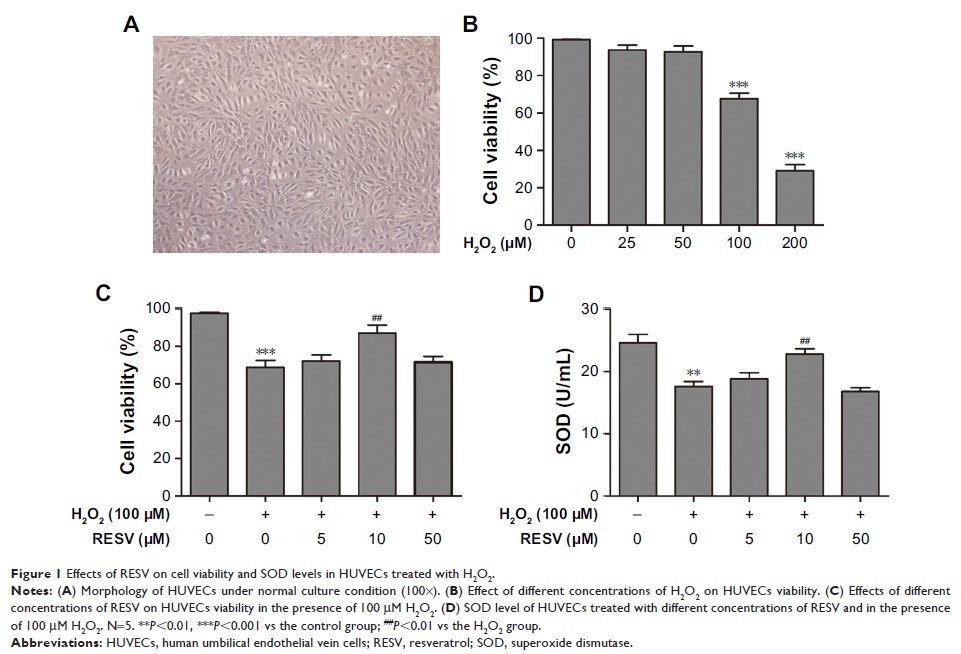108384
论文已发表
注册即可获取德孚的最新动态
IF 收录期刊
- 3.4 Breast Cancer (Dove Med Press)
- 3.2 Clin Epidemiol
- 2.6 Cancer Manag Res
- 2.9 Infect Drug Resist
- 3.7 Clin Interv Aging
- 5.1 Drug Des Dev Ther
- 3.1 Int J Chronic Obstr
- 6.6 Int J Nanomed
- 2.6 Int J Women's Health
- 2.9 Neuropsych Dis Treat
- 2.8 OncoTargets Ther
- 2.0 Patient Prefer Adher
- 2.2 Ther Clin Risk Manag
- 2.5 J Pain Res
- 3.0 Diabet Metab Synd Ob
- 3.2 Psychol Res Behav Ma
- 3.4 Nat Sci Sleep
- 1.8 Pharmgenomics Pers Med
- 2.0 Risk Manag Healthc Policy
- 4.1 J Inflamm Res
- 2.0 Int J Gen Med
- 3.4 J Hepatocell Carcinoma
- 3.0 J Asthma Allergy
- 2.2 Clin Cosmet Investig Dermatol
- 2.4 J Multidiscip Healthc

白藜芦醇通过上调人脐静脉内皮细胞中的自噬来减缓由过氧化氢诱导的衰老
Authors Du L, Chen E, Wu T, Ruan Y, Wu S
Received 11 July 2018
Accepted for publication 25 December 2018
Published 22 February 2019 Volume 2019:13 Pages 747—755
DOI https://doi.org/10.2147/DDDT.S179894
Checked for plagiarism Yes
Review by Single-blind
Peer reviewers approved by Dr Colin Mak
Peer reviewer comments 3
Editor who approved publication: Prof. Dr. Cristiana Tanase
Purpose: Resveratrol
(RESV; trans-3,5,4'-trihydroxystilbene) has emerged as a potential new
therapeutic for age-related atherosclerotic diseases. However, the effect of
RESV on cellular aging and its underlying mechanisms remain unknown. Therefore,
the aim of this study was to examine whether RESV can delay cellular aging
through upregulation of autophagy.
Materials and methods: Human
umbilical endothelial vein cells (HUVECs) were divided into four groups: the
control group, and the hydrogen peroxide (H2O2) alone, H2O2 + RESV
pretreatment, and H2O2 + 3-methyladenine (3-MA) + RESV
pretreatment intervention groups. The cell viability was evaluated by a cell
counting kit-8 assay. Superoxide dismutase (SOD) activity and intracellular
reactive oxygen species (ROS) levels were tested using commercial kits.
Senescence-related β-galactosidase activities were detected by
immunohistochemical staining. The expression levels of aging-related and
autophagy-related markers, including phosphorylated Rb (p-Rb), LC3, and p62,
with or without RESV were measured by Western blotting.
Results: Pretreatment
with 10 µM RESV increased the cell viability and SOD levels. The remarkably
higher positive rate of senescence-associated β-galactosidase and increased
intracellular ROS levels in the H2O2 treatment group were reversed by
treatment with 10 µM RESV. As compared to the H2O2 treatment
group, 10 µM RESV could upregulate autophagy through the regulation of p-Rb,
LC3, and p62 levels. The anti-aging effect of RESV via an autophagy regulation
mechanism was further confirmed by the suppression of these effects with 3-MA
treatment.
Conclusion: RESV may
reverse and delay the aging process of HUVECs via upregulation of autophagy and
could be a candidate therapeutic for age-related atherosclerotic diseases.
Keywords: oxidative
stress, senescence, LC3, p62, p-Rb
